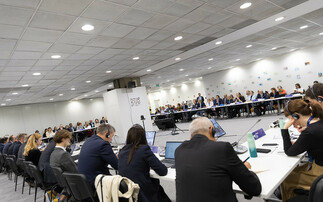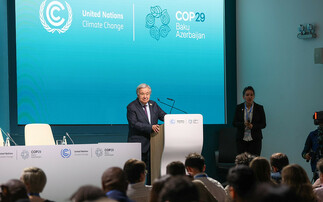EU reacts strongly to John Kerry's suggestion any Paris climate treaty will not be legally binding
The EU has said any global climate deal reached in Paris next month will be legally binding, despite US Secretary of State John Kerry's assertion this week's that the negotiations will not deliver a binding treaty.
Speaking to the Financial Times on Wednesday, Kerry said any agreement reached at December's climate talks would not legally require countries to cut their carbon emissions, stressing the deal was "definitively not going to be a treaty".
But a spokeswoman for the EU's climate commissioner Miguel Arias Cañete told the Guardian yesterday that the Paris deal must be an international legally binding agreement. "The title of the agreement is yet to be decided but it will not affect its legally binding form," she reportedly said.
French foreign minister Laurent Fabius also challenged Kerry's assertion about the status of the agreement yesterday, saying this year's climate talks were not just "hot air" and suggesting his US counterpart may have "confused things".
"Jurists will discuss the legal nature of an accord on whether it should be termed as a treaty or an international agreement," Fabius told reporters. "But the fact that a certain number of dispositions should have a practical effect and be legally binding is obvious so let's not confuse things, which is perhaps what Mr Kerry has done."
Governments are to meet from later this month under the United Nations Framework Convention Climate Change (UNFCCC) process to try to deliver a new global climate change agreement. Hopes are running high that an ambitious new deal can be reached, but divisions remain over the official legl status such an agreement should take. No legally binding climate treaty has been signed since the 1997 Kyoto protocol, which imposed binding emissions targets on those countries that ratified it - though the US never did this.
Any new agreement is expected to include a significant voluntary element, with the proposed new deal centring on each nation putting forward non-binding national climate action plans known as Intended Nationally Determined Contributions (INDCs).
However, the EU and a host of developing countries have said the Paris treaty must be "legally binding", and pushed for the timetable set at the 2011 climate conference in Durban, which outlined that a global legal framework covering all countries should be set in 2015 and enter into force in 2020.
A number of key players at the talks want to see any deal put on some form of legal footing that could strengthen the system of INDCs with regular progress reports and additional mechanisms for curbing emissions and mobilising climate finance in developing nations.
But the Obama administration would face major challenges ratifying any legal treaty in the Republican-dominated US Congress. Instead, Obama would likely aim to deliver any changes agreed in Paris through an executive order.
While acknowledging the US had to take account of domestic political sensitivities, the French foreign minister said the legally binding nature of the agreement "is not a political discussion" but a "real accord with facts", according to Reuters.
The French government has pushed hard to lay a solid groundwork in the lead-up to the Paris talks in order to reduce the chances of the talks collapsing, as happened in the Copenhagen conference in 2009. But a number of points of contention still remain ahead of the meeting, including the crucial issues of climate finance and provisions for helping nations cope with the loss and damage caused by climate change.
This article is part of BusinessGreen's Road to Paris hub, hosted in association with PwC.







